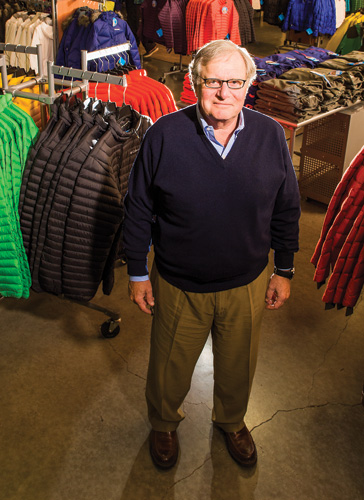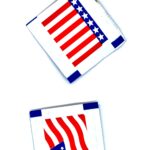The CEO of Columbia Sportswear talks about tariffs, the dismantling of global trade agreements and the impact on Oregon businesses.
O.B.: How have Trump Administration policies changed the way you do business?
T.B.: Policies and pronouncements out of Washington, D.C., in the last year have been intentionally disruptive in a variety of ways, particularly for international businesses. From restrictions on international travel and legal immigration to tax reform proposals for a “Border Adjustment Tax,” to rejection of international trade arrangements, politicians in Washington, D.C. have created uncertainty and required us to spend more time and energy on public policy than at any time in our 80-year history.
O.B.: What does U.S. isolationism mean for Oregon businesses?
T.B.: The so-called “America First” agenda, as articulated in Washington, will leave America last, and that may be particularly true for an internationally oriented state like Oregon. For most of Columbia’s 80-year history, the United States has led the world in opening international markets, setting the rules for global engagement and creating economic opportunity. Directly and indirectly, Oregonians depend on free and fair trade. Whether it is Oregon farmers exporting their goods, workers on the docks loading and unloading imported or exported cars and other products, or innovators in the apparel and footwear industries creating the next hit for global markets, Oregonians benefit from global engagement.
The rules are now being written by other countries, for the benefit of those countries, as has been evident with the Trans-Pacific Partnership, a multilateral agreement that was led by the U.S. and is now proceeding without us. Global businesses like Columbia will adapt to work within the regional trading arrangements, but there is no doubt it creates new challenges for Oregon and that the state has lost opportunities.
Below: Tim Boyle, in the Columbia Sportswear employee store (OB, archive)

O.B: What are the implications for Oregon apparel companies around the threat of a trade war and Trump’s goal of bringing more jobs to the U.S. in apparel?
T.B.: The notion that high tariffs will cause apparel and footwear jobs to move back to the U.S. is pure fantasy. This is one industry that has been subject to extremely high tariffs since Herbert Hoover was president, and it is a lasting legacy of that era. We already face double-digit import taxes, some as high as 37.5% on our products, which have a significant effect on consumers and our industry. If decades of high import taxes did not bring apparel and footwear manufacturing jobs to the United States, that should be instructive for everyone, particularly politicians in Washington. We would anticipate that punitive taxes on products imported into the U.S. would cause other countries to retaliate with similar punitive taxes on U.S. exports.
O.B.: What is the impact on labor and environmental protections?
Columbia has supported labor and environmental protections in trade agreements, and we feel strongly that this is one reason U.S. leadership is so important. In our industry, companies take on a great deal of responsibility for ensuring social and environmental compliance, and we would all benefit from greater governmental commitments in those areas. We understand the criticisms of the Trans-Pacific Partnership, but most of those criticisms did not relate to provisions affecting apparel and footwear. Critics who pushed to kill TPP in order to improve upon it will be sorely disappointed by what will occur now that the U.S. is no longer a part. Whether in TPP, which is proceeding without the U.S., or in other regional trade pacts that exclude the U.S., the ground rules will be set by other countries to reflect their interests and their standards.
O.B.: What is the ideal situation for your company moving forward on global trade?
T.B.: We have never had an ideal situation but have managed to survive and thrive over the course of 80 years despite heavily protectionist measures directed at our industry for nearly a century. The trade rules were not ideal for apparel and footwear, and in many ways were bad for us, but the rules were mostly clear and gave us a largely predictable framework for engaging in the world.
We have succeeded because of thousands of employees who, over time, have been able to focus on creating and delivering amazing, innovative products that the world’s consumers want. We have adapted and navigated our way through massive market changes, and multiple national and international crises, over the course of many decades, always maintaining that thoughtful focus on consumers. What we have not often dealt with is political leaders who are purposely unpredictable and disruptive without thoughtful alternatives or debate, so that is even less than ideal. If we have an ideal situation, it is that we be given the freedom to continue a laser focus on consumers and creating best-in-class products, and given the freedom from focusing on politicians.
When we wade into a swamp, we want to do so to test our product, not because we need to engage a lobbyist in the nation’s capitol.
O.B: What do you think Oregon leaders can do in this environment?
T.B.: Oregon leaders can try to encourage trade, but open markets necessarily require national leadership. What Oregon leaders can do is bring pressure to bear in Washington, D.C., and to underscore for all the economic opportunity that has been created in the U.S. by engaging with other countries. Oregon leaders also need to invest in education at all levels so that Oregonians are prepared to understand and engage in the global economy.
A version of this interview appears in the April 2018 issue of Oregon Business. Click here to subscribe.







